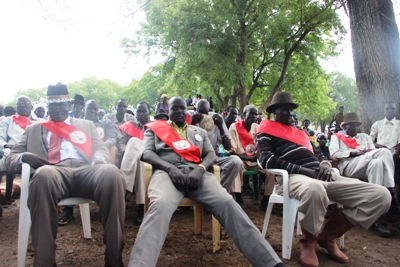Traditional chiefs restrict laws on divorce in Jonglei state
June 2, 2016 (BOR)—Traditional chiefs of Jonglei state have expressed concerns over the overwhelming divorce cases in Jonglei state, which prompted the state government to order for a review of customary laws to minimise separation among the married.

The Bor county paramount chief, Alier Aluong, said the Dinka Bor community had fixed the bring price to 30 heads of cattle, adding that the divorce wouldn’t be granted by any statutory courts unless by the chiefs concerned at village or payams level.
“We have agreed that the pride price is 30 heads of cattle. If you pay more than that, that is not bad so long as you want to please your in-laws. But in case you separate with the woman, the court will only consider 30 heads of cattle from which the necessary reductions would be made from, in case you have kids with her. The rest will not be considered”, said Aluong.
“The other biggest issue, if you mess with someone’s wife, she will not be your wife. If you elope someone’s wife, you will be charged some six heads of cattle and imprisonment for some months”, he added.
Most cases in the statutory courts in Bor are dominated by women wanting to separate with their husbands, but chiefs argued that such cases be handled by traditional courts.
Achieu Duoi, a woman representative, agreed with laws restricting divorce, saying it should not be granted on un-necessary grounds, as the statutory courts practiced.
She further said the existing customary laws should reflect some articles prohibiting the use on skins of various emollient that come as bath additives and showers gels.
“I am against the boys who go sagging, and some ladies who apply creams to change their skins’ colour. We have tried to talk against them, but they had ignored us. Our mothers and grandmothers did not apply creams to change their bodies’ colour. You men had allowed these women to change their skin colour because you tend to love ladies with brown skins, and leave the black ones”, Achieu told Sudan Tribune in Thursday.
The customary laws will be announced to the public by the governor’s office if approved.
(ST).
